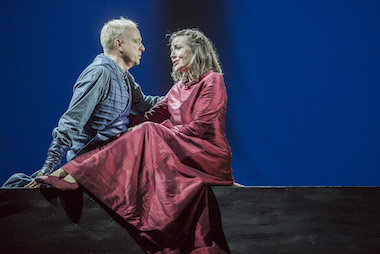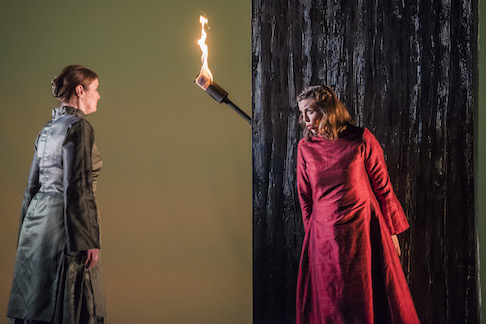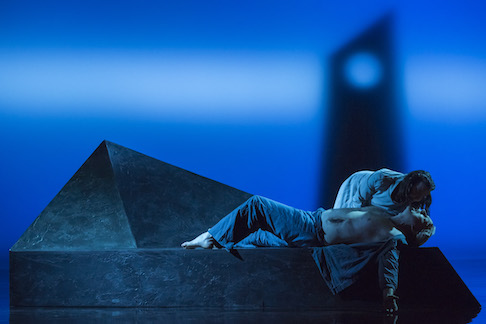Recently in Reviews
English Touring Opera are delighted to announce a season of lyric monodramas to tour nationally from October to December. The season features music for solo singer and piano by Argento, Britten, Tippett and Shostakovich with a bold and inventive approach to making opera during social distancing.
This tenth of ten Live from London concerts was in fact a recorded live performance from California. It was no less enjoyable for that, and it was also uplifting to learn that this wasn’t in fact the ‘last’ LfL event that we will be able to enjoy, courtesy of VOCES8 and their fellow vocal ensembles (more below …).
Ever since Wigmore Hall announced their superb series of autumn concerts, all streamed live and available free of charge, I’d been looking forward to this song recital by Ian Bostridge and Imogen Cooper.
The Sixteen continues its exploration of Henry Purcell’s Welcome Songs for Charles II. As with Robert King’s pioneering Purcell series begun over thirty years ago for Hyperion, Harry Christophers is recording two Welcome Songs per disc.
Although Stile Antico’s programme article for their Live from London recital introduced their selection from the many treasures of the English Renaissance in the context of the theological debates and upheavals of the Tudor and Elizabethan years, their performance was more evocative of private chamber music than of public liturgy.
In February this year, Albanian soprano Ermonela Jaho made a highly lauded debut recital at Wigmore Hall - a concert which both celebrated Opera Rara’s 50th anniversary and honoured the career of the Italian soprano Rosina Storchio (1872-1945), the star of verismo who created the title roles in Leoncavallo’s La bohème and Zazà, Mascagni’s Lodoletta and Puccini’s Madama Butterfly.
Evidently, face masks don’t stifle appreciative “Bravo!”s. And, reducing audience numbers doesn’t lower the volume of such acclamations. For, the audience at Wigmore Hall gave soprano Elizabeth Llewellyn and pianist Simon Lepper a greatly deserved warm reception and hearty response following this lunchtime recital of late-Romantic song.
Collapsology. Or, perhaps we should use the French word ‘Collapsologie’ because this is a transdisciplinary idea pretty much advocated by a series of French theorists - and apparently, mostly French theorists. It in essence focuses on the imminent collapse of modern society and all its layers - a series of escalating crises on a global scale: environmental, economic, geopolitical, governmental; the list is extensive.
For this week’s Live from London vocal recital we moved from the home of VOCES8, St Anne and St Agnes in the City of London, to Kings Place, where The Sixteen - who have been associate artists at the venue for some time - presented a programme of music and words bound together by the theme of ‘reflection’.
'Such is your divine Disposation that both you excellently understand, and royally entertaine the Exercise of Musicke.’
Amongst an avalanche of new Mahler recordings appearing at the moment (Das Lied von der Erde seems to be the most favoured, with three) this 1991 Mahler Second from the 2nd Kassel MahlerFest is one of the more interesting releases.
‘And there was war in heaven: Michael and his angels fought against the dragon; and the dragon fought and his angels, And prevailed not; neither was their place found any more in heaven … that old serpent … Satan, which deceiveth the whole world: he was cast out into the earth, and his angels were cast out with him.’
If there is one myth, it seems believed by some people today, that probably needs shattering it is that post-war recordings or performances of Wagner operas were always of exceptional quality. This 1949 Hamburg Tristan und Isolde is one of those recordings - though quite who is to blame for its many problems takes quite some unearthing.
There was never any doubt that the fifth of the twelve Met Stars Live in Concert broadcasts was going to be a palpably intense and vivid event, as well as a musically stunning and theatrically enervating experience.
‘Love’ was the theme for this Live from London performance by Apollo5. Given the complexity and diversity of that human emotion, and Apollo5’s reputation for versatility and diverse repertoire, ranging from Renaissance choral music to jazz, from contemporary classical works to popular song, it was no surprise that their programme spanned 500 years and several musical styles.
The Academy of St Martin in the Fields have titled their autumn series of eight concerts - which are taking place at 5pm and 7.30pm on two Saturdays each month at their home venue in Trafalgar Square, and being filmed for streaming the following Thursday - ‘re:connect’.
The London Symphony Orchestra opened their Autumn 2020 season with a homage to Oliver Knussen, who died at the age of 66 in July 2018. The programme traced a national musical lineage through the twentieth century, from Britten to Knussen, on to Mark-Anthony Turnage, and entwining the LSO and Rattle too.
With the Live from London digital vocal festival entering the second half of the series, the festival’s host, VOCES8, returned to their home at St Annes and St Agnes in the City of London to present a sequence of ‘Choral Dances’ - vocal music inspired by dance, embracing diverse genres from the Renaissance madrigal to swing jazz.
Just a few unison string wriggles from the opening of Mozart’s overture to Le nozze di Figaro are enough to make any opera-lover perch on the edge of their seat, in excited anticipation of the drama in music to come, so there could be no other curtain-raiser for this Gala Concert at the Royal Opera House, the latest instalment from ‘their House’ to ‘our houses’.
"Before the ending of the day, creator of all things, we pray that, with your accustomed mercy, you may watch over us."
Reviews

10 Jul 2017
Longborough Festival Opera: A World Class Tristan und Isolde in a Barn Shed
Of all the places, I did not expect a sublime Tristan und Isolde in a repurposed barn in the Cotswolds. Don’t be fooled by Longborough’s stage without lavish red curtains to open and close each act. Any opera house would envy the riveting chemistry between Peter Wedd and Lee Bisset in this intimate, 500 seat setting. Conductor Anthony Negus proved himself a master at Wagner’s emotional depth. Epic drama in minimalistic elegance: who needs a big budget when you have talent and drama this passionate?
Wagner described Tristan und Isolde as a dramatic action rather than an opera. An actor’s director, Carmen Jakobi seemed to have this in mind. With a mostly empty stage and a few geometrical building blocks around which the singers acted, Ms Jakobi emphasized theatrical drama through the aesthetic of Japanese Noh Theater. Set and designer Kimie Nakano’s creations reminded me of Samurai fashion. Her sharp designs suited the elegance unfolding on stage. Ben Ormerod’s exquisite colours in light and shadow highlighted the moonstruck melodrama.
The singers in their acting elevated the experience to the sublime.
During the First Act, Ms. Bisset displayed Isolde’s venomous hatred towards Tristan through fierce acting. Harriet Williams sang Brangäne with a concerned gravitas. As Isolde’s handmaiden and confident, she counterbalanced Ms. Bisset’s raving passions. She even relayed some slightly Sapphic suggestions to the erotic overtones of Wagner’s music.
After Brangäne switched Isolde’s intended poison for Tristan with a love potion, the lovers collapsed on stage, while reaching in a desperate grasp longing for each other. Wedd and Bisset’s chemistry heightened the love between Tristan and Isolde with profound effects.
 Lee Bisset as Isolde and Harriet Williams as Brangäne
Lee Bisset as Isolde and Harriet Williams as Brangäne
In Act II, the two stars continued to fire up the drama. In their love duet, these two expressive powerhouses erotically charged their chemistry with rapturous kissing and lustful groping. I haven’t seen anything so explicit, yet elegant and authentic, quite like this before in Wagner. I don’t know enough about the man, but based on his highly charged music, I am pretty sure he would have approved of this sexual display.
In the final act with Tristan’s rotting flesh wound inflicted by Melot on full display, Wedd created a terrific momentum. With rip roaring vocal energy, he brought out all the drama in his part. “It’s all about the und in Tristan und Isolde,” I can still hear my college teacher proclaim. As Wedd sung about his love for Isolde, his other half, his und, I finally got what Mr. Stephenson meant: there’s no love without and. Tonight, what used to be a mere academic idea became a passionate memory. I was so struck by my epiphanous recollection, I actually let a laugh escape.
 Peter Wedd as Tristan and Lee Bisset as Isolde during the Liebestod
Peter Wedd as Tristan and Lee Bisset as Isolde during the Liebestod
The other actors certainly added to the drama. Stuart Pendred’s Kurwenal offered convincing despair over the dying Tristan. Though his acting conveyed the worry and love for his fraternal companion, Pendred’s voice lacked body. After having been told about Brangäne duplicitous switch, Geoffrey Moses with avuncular conviction frailly vocalised Marke’s compassion for Tristan. Stephen Rooke conveyed Melot effectively: I just wanted Tristan’s nemesis to die.
A protege of Boulez and loyal Bayreuth enthusiast, Negus invigorated Wagner’s magnificent suspense ceaselessly, though not without a few off sounding passages from the orchestra. The Brass unnecessarily relocated above the audience towards the end sounded painfully muffled. However, the extraordinary singing positively inspired the orchestra to great heights. With the strings swelling and contracting, Negus offered dynamic momentum to Wedd and Bisset’s sizzling eroticism.
Ms. Bisset stole my heart as Isolde. I envy the audience who heard her Sieglinde. I checked all Ms. Bisset’s future engagements. For now, one must travel to Britain to witness her talents. With their chemistry conveying true love with such authenticity, I can’t imagine I will soon encounter another coupling quite like Wedd and Bisset.
During the applause, after Isolde’s Liebestod and the music had died off, this modest soprano appeared to be so drained from her performance, so utterly exhausted, it seemed Ms Bisset herself would burst into tears. Based on the flamboyant characters in the audience, this in-crowd appreciated all too well the rustic excellence at Longborough. I cannot wait to have my heart broken again here.
Next year at Longborough Opera Festival, you can experience Wagner’s Der fliegende Holländer.
David Pinedo
Cast and production information:
Tristan: Peter Wedd; Isolde: Lee Bisset; King Marke: Geoffrey Moses; Kurwenal: Stuart Pendred; Brangäne: Harriet Williams; Melot: Stephen Rooke; Sailor/Shepard: Sam Furness; Helmsman: Adam Green; LFO Orchestra; Conductor: Anthony Negus; Director: Carmen Jakobi; Designer: Kimie Nakano; Lighting Designer: Ben Ormerod


